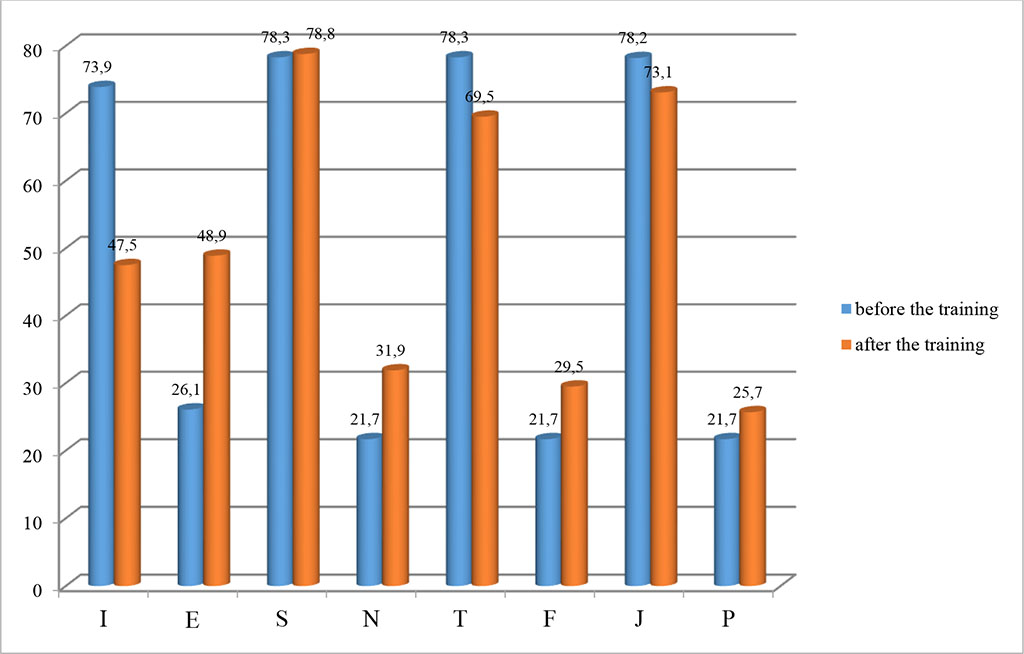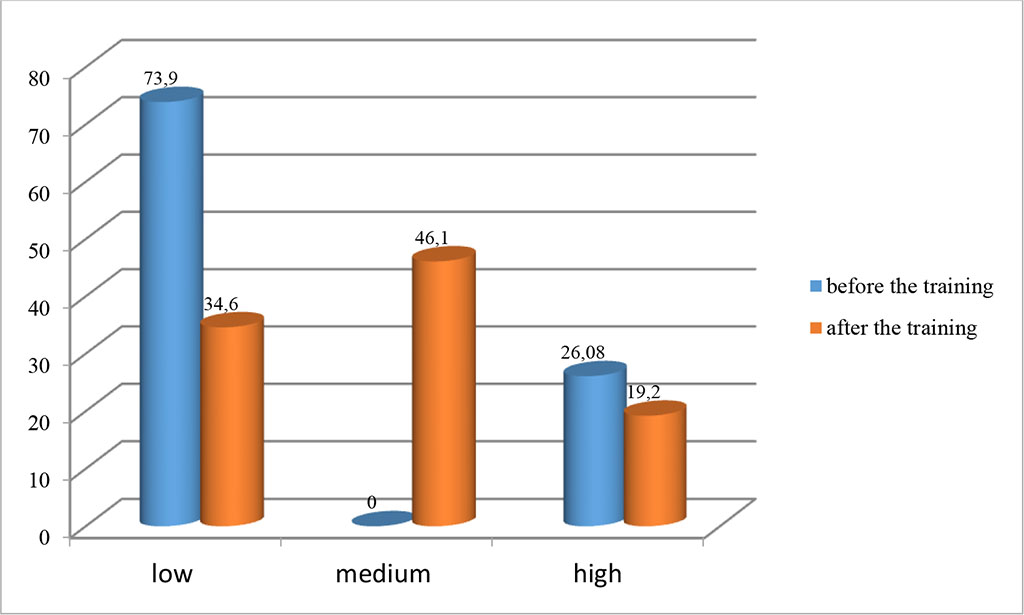- Home
- About the Journal
- Peer Review
- Editorial Board
- For Authors
- Reviewer Recognition
- Archive
- Contact
- Impressum
- EWG e.V.
The article presents results of a program of psychological support provided to medical residents. The program was implemented at Astrakhan Medical University (Astrakhan, Russia) in February 2023. This program was aimed at psychological correction of communicative skills and empathic abilities, as professionally important qualities of a medical professional. 38 residents of the specialty Infectious diseases were involved in the program. We developed and implemented the program of psychological support, which consists of four stages: 1) psychological diagnosis; 2) theoretical block; 3) psychological correction in form of individual and group trainings on empathy level and communication skills (conversation, cognitive-behavioral psychotherapy, transactional analysis, Ericksonian hypnosis techniques); 4) re-diagnosis in order to assess psychological indicators.
Mastering the techniques of managing the emotional state positively influences the psychological well-being of medical residents. Our program made it possible to improve the soft competencies required for medical professionals.
Keywords: psychological support program; medical residents; personal traits; medical activity; professionally important qualities of a doctor; emotional condition; residency
Practicing medicine is an emotionally intense profession. It deals with the man-to-man sphere and implies constant interaction with patients and colleagues. As a result, there is a high probability of occupational stress and a whole range of psycho-emotional disorders, such as: burnout syndrome, maladaptive thinking, various neurotic conditions, etc. [12-14]. Residents may have symptoms of anxiety and depression at the initial stages [5, 10, 11]. This requires changes in the way of thinking, in dynamic stereotypes, formation and correction of the professional qualities and personality traits in a medical professional. Moreover, studies show empathy declines during medical training. [3]. One of the conditions for the development of essential professional qualities is psychological support. Currently, psychological support is understood as a method that provides the necessary conditions for a person to make the development of effective decisions [8]. In addition, support is understood as psychological assistance, which is organized under special conditions in order to form and correct psychological characteristics and, accordingly, improve the quality of education [2-4]. One of the forms of psychological and pedagogical support is psychological training. Various types of training can be used in psychological training, for example, lectures, problem solving, business games, i.e. to gain certain skills and professional competencies that are necessary for the respondent. Mastering the techniques of managing the emotions enables to improve the mental health of medical residents. The proposed program of psychological support allows gaining the competencies required in medical professionals.
The aim of the study: to develop and implement a psychological support program enabling to improve the level of empathy and communication skills, thus, preventing stressful situations in the residents of the specialty infectious diseases.
The program was implemented in February 2023. The study involved 38 first and second year residents of the specialty "Infectious Diseases" at Astrakhan State Medical University (Astrakhan, Russia). The program of psychological support consists of four stages: Stage 1 - psychological diagnosis, which includes: 1) The Keirsey model (adapted by B. Ovchinnikov et al[6]. The Keirsey temperament sorter is assessment technique based on the studies of Jung and Myers-Briggs; 2) diagnosis of the level of empathic abilities (V.V. Boyko) [2]; 3) Stage 2 includes a theoretical block; Stage 3 is the psychological correction in the form of individual and group psychological trainings (conversation, cognitive-behavioral psychotherapy, transactional analysis, Ericksonian hypnosis techniques). Stage 4 - re-diagnosis in order to assess psychological indicators. To identify the significance of differences, Statistics 10 program and the Mann-Whitney U-test and were used. (Table 1).
Table 1. Difference Significance Table
| difference factor | Criterion | Significance (p<0,05) |
| extraversion | Mann-Whitney U test | 0,000 |
| Empathic abilities | Mann-Whitney U test | 0,002 |
The results of the study are presented in the figures.
In December 2022, we had conducted an empirical study with participation of 45 residents of the specialty infectious diseases and 40 residents of the specialty emergency medical care. Thus, the risk groups among the medical residents were identified. The following stable personal traits were revealed in the infectious disease doctors: introversion (73.9%), sensory (78.3%), logic (thinking type) (78.3%), rationality (78.2%). In other words, the psychological portrait for the medical residents is - ISTJ. They are characterized by high responsibility, diligence, reliability in the work, a high sense of duty and they follow a clear life plan. According to K.G. Jung, introverts are characterized by the following leading determinants: 1. Reflection, connection with inner reality - impressions caused by objects; 2. Defensive position, tendency to move away from objects. They are more comfortable in the circle of close people; and have difficulties in making a contact. Medical professionals are expected to have high communication skills; however, the psychological portrait of the residents is dominated by introversion, which, of course, worsens the communicative and emotional contact between the doctor and the patient. In addition, low communication skills affect empathic abilities, and, accordingly, the quality of medical services, as well as patient satisfaction. Special programs of psychological support are needed to correct the deficits in communicative skills in the residents of the specialty infectious diseases.
The second stage of the empirical study included an anonymous survey by V.V. Boyko. According to our data, a low level of empathic abilities was found in the residents - 73.9%. Low levels of empathy, which are typical for the residents of specialty infectious diseases, obviously affect the communicative and emotional contact between the doctor and the patient, and interfere with professional activities. Thus, the psychological factors that reduce the quality of communicative interaction in the dyad "Doctor-patient", namely "introversion" and a low level of empathy, were detected.
Therefore, we have developed the program of psychological support for the first and second year residents of the specialty infectious diseases. In order to correct the level of empathy and communication skills, trainings were developed. There were group sessions scheduled for two hours over four weeks. Among the most effective psychotherapeutic methods today are cognitive behavioral therapy and Ericksonian hypnosis. Each stage of the program involves various organizational and methodological forms, target functions and activities (Table 2).
Table 2. Stages and content of the psychologist’s work with the residents
| Name of the stage and activities | Purpose of the activity | |
| 1. | Diagnostic stage: psychodiagnostic assessment of the psychological status and personal characteristics, identification of communication features and the level of empathy using conversation, observation, psychodiagnostic tests - D. Keirsey's test, the method of empathic abilities by V.V. Boyko. | Assessment of psychological status, personality traits, identification of communicative features and skills |
| 2. | Theoretical block: at the stage of the theoretical block and psychological correction for medical residents, it is necessary to study the Calgary-Cambridge model of medical consultation, which has proven its effectiveness in the interaction of a doctor and a patient and includes skills development. | Learning stage |
| 3. | The stage of psychological correctional includes: – individual and group forms of psychological training of the level of empathy and communication skills in the medical residents (conversation, cognitive-behavioral psychotherapy, transactional analysis, Ericksonian hypnosis techniques). – psychological sessions for better communication skills and empathy. | Comprehensive psychocorrectional and psychological assistance |
| 4. | Monitoring of the psychological state: dynamic assessment (control) of the psychological status and personal characteristics of the residents with a low level of empathic characteristics and low communication skills using psychodiagnostic tests (interview; test by D. Keirsey; method of empathic abilities by V.V. Boyko). | Dynamic assessment of psychological status, personality traits, communicative empathic features and skills |
After the training we observed positive changes in the levels of communication skills and empathic abilities of the medical residents (Figure 1). Figure 1 shows the mean indicators of the Keirsey model. The stable personal characteristics were: extraversion (48.9%), sensory (78.8%), logic (thinking type) (69.5%), rationality (73.1%). In other words, the psychological portrait for the medical residents is - ESTJ. Extraversion (orientation to the outside world) refers to an essential psychological trait and implies sociability and sociability. The definition of extraversion, as well as introversion, was given by the Swiss psychologist Carl Gustav Jung.

Figure 1. Mean values of the personal characteristics in the medical residents by the Keirsey model before and after the training
High communication skills are essential in medical professionals. After the training the young doctors demonstrated a higher communicative competence, which positively influences the interaction in the "Doctor-Patient" dyad. The residents are perceived as more sociable and consistent; they follow a strict plan, tend to make independent decisions and take responsibility, also gaining leadership qualities. After the implementation of complex psycho-correctional and psychological assistance, the psychological state was re-monitored, using a survey based on the method of empathic abilities by V.V. Boyko (Figure 2).

Figure 2. Mean values of empathic abilities in the medical residents by V.V. Boyko method before and after the training
The mean level of empathic abilities in the residents assessed by V.V. Boyko method was 46.1%. This result represents the optimal level of empathy development; residents tend to show emotions and sympathy. Besides, they are able to manage their own emotions, which may prevent such disorders as burnout syndrome, which are often detected among medical workers. Thus, the residents of the specialty infectious diseases showed a positive trend in psychological indicators. Extraversion and higher empathic abilities lead to improvement in the communicative interaction between the doctor and the patient.
Re-diagnosis showed higher levels of extraversion values and empathic abilities in the medical residents (after training).
Mastering the techniques of managing emotions enabled medical residents to improve and maintain their psychological state. The proposed program of psychological support has proven to be a reliable tool for gaining essential soft competencies required in medical professionals.